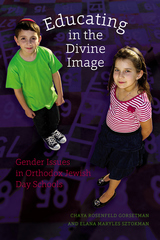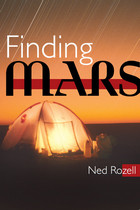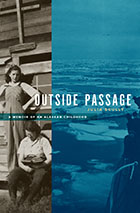4 books about Jewish girls

Educating in the Divine Image
Gender Issues in Orthodox Jewish Day Schools
Chaya Rosenfeld Gorsetman and Elana Maryles Sztokman
Brandeis University Press, 2013
Although recent scholarship has examined gender issues in Judaism with regard to texts, rituals, and the rabbinate, there has been no full-length examination of the education of Jewish children in day schools. Drawing on studies in education, social science, and psychology, as well as personal interviews, the authors show how traditional (mainly Orthodox) day school education continues to re-inscribe gender inequities and socialize students into unhealthy gender identities and relationships. They address pedagogy, school practices, curricula, and textbooks, as along with single-sex versus coed schooling, dress codes, sex education, Jewish rituals, and gender hierarchies in educational leadership. Drawing a stark picture of the many ways both girls and boys are molded into gender identities, the authors offer concrete resources and suggestions for transforming educational practice.
[more]

Fanny Herself
Edna Ferber
University of Illinois Press, 1917
Heralded by one reviewer as "the most serious, extended and dignified of [Edna] Ferber's books," Fanny Herself is the intensely personal chronicle of a young girl growing up Jewish in a small midwestern town. Packed with the warmth and the wry, sidelong wit that made Ferber one of the best-loved writers of her time, the novel charts Fanny's emotional growth through her relationship with her mother, the shrewd, sympathetic Molly Brandeis.
"You could not have lived a week in Winnebago without being aware of Mrs. Brandeis," Ferber begins, and likewise the story of Fanny Brandeis is inextricable from that of her vigorous, enterprising mother. Molly Brandeis is the owner and operator of Brandeis' Bazaar, a modest general store left to her by her idealistic, commercially inept late husband. As Fanny strives to carve out her own sense of herself, Molly becomes the standard by which she measures her intellectual and spiritual progress.
Fanny's ambivalent feelings about being Jewish, her self-deprecating attitude toward her gift for sketching and drawing, and her inspired success as a businesswoman all contribute to the flesh-and-blood complexity of Ferber's youthful, eminently believable protagonist. She is accompanied on her journey by impeccably drawn characters such as Father Fitzpatrick, the Catholic priest in Winnebago; Ella Monahan, buyer for the glove department of the Haynes-Cooper mail order house; Fanny's brother, Theodore, a gifted violinist for whose musical education Molly sacrifices Fanny's future; and Clarence Heyl, the scrappy columnist who never forgot how Fanny rescued him from the school bullies.
Ferber's only work of fiction with a strong autobiographical element, Fanny Herself showcases the author's enduring interest in the capacity of strong women to transcend the limitations of their environment and control their own circumstances. Through Fanny's honest struggle with conflicting values–financial security and corporate success versus altruism and artistic integrity–Ferber grapples with some of the most deeply embedded contradictions of the American spirit.
"You could not have lived a week in Winnebago without being aware of Mrs. Brandeis," Ferber begins, and likewise the story of Fanny Brandeis is inextricable from that of her vigorous, enterprising mother. Molly Brandeis is the owner and operator of Brandeis' Bazaar, a modest general store left to her by her idealistic, commercially inept late husband. As Fanny strives to carve out her own sense of herself, Molly becomes the standard by which she measures her intellectual and spiritual progress.
Fanny's ambivalent feelings about being Jewish, her self-deprecating attitude toward her gift for sketching and drawing, and her inspired success as a businesswoman all contribute to the flesh-and-blood complexity of Ferber's youthful, eminently believable protagonist. She is accompanied on her journey by impeccably drawn characters such as Father Fitzpatrick, the Catholic priest in Winnebago; Ella Monahan, buyer for the glove department of the Haynes-Cooper mail order house; Fanny's brother, Theodore, a gifted violinist for whose musical education Molly sacrifices Fanny's future; and Clarence Heyl, the scrappy columnist who never forgot how Fanny rescued him from the school bullies.
Ferber's only work of fiction with a strong autobiographical element, Fanny Herself showcases the author's enduring interest in the capacity of strong women to transcend the limitations of their environment and control their own circumstances. Through Fanny's honest struggle with conflicting values–financial security and corporate success versus altruism and artistic integrity–Ferber grapples with some of the most deeply embedded contradictions of the American spirit.
[more]

Finding Mars
Ned Rozell
University of Alaska Press, 2011
Finding Mars is an interwoven tale of science, travel, and adventure, as science writer Ned Rozell accompanies permafrost researcher—and inveterate wanderer—Kenji Yoshikawa on a 750-mile trek by snowmobile through the Alaska wilderness. Along the way, Rozell learns about Yoshikawa’s fascinating life, from his boyhood in Tokyo to the youthful wanderlust that led him to push a wheeled cart across the Sahara, ski to the South Pole, and take a sailboat into the frozen reaches of the Arctic Ocean, spending a winter frozen in the ice near Barrow. It’s an always on-the-move account of a man driven not just by the desire to fill in the blank spots on a map, but also to learn everything he can about them—and a ringing testament to the power of science, enthusiasm, and individual inspiration.
[more]

Outside Passage
A Memoir of an Alaskan Childhood
Julia Scully
University of Alaska Press, 2010
When Julia Scully was seven years old, her father committed suicide, and she and her sister were sent to an orphanage. Two years later, emotionally damaged by the isolation and brutality of the orphanage, the girls followed their mother to the near-wilderness of the gold-mining territory north of Nome, Alaska, where she had leased a roadhouse in the tiny settlement of Taylor. Julia had no idea what to expect when she arrived, but to her surprise, she found a healing power in the stark beauty of the vast tundra. Later, she reveled in the boisterous, chaotic boomtown atmosphere that prevailed when thousands of American troops descended on Nome at the outbreak of World War II.
Outside Passage is a lyrical and affecting memoir of those years, simultaneously an emotional account of a young girl’s first steps into adulthood and a unique portrait of a vanished frontier life.
Outside Passage is a lyrical and affecting memoir of those years, simultaneously an emotional account of a young girl’s first steps into adulthood and a unique portrait of a vanished frontier life.
[more]
READERS
Browse our collection.
PUBLISHERS
See BiblioVault's publisher services.
STUDENT SERVICES
Files for college accessibility offices.
UChicago Accessibility Resources
home | accessibility | search | about | contact us
BiblioVault ® 2001 - 2024
The University of Chicago Press









